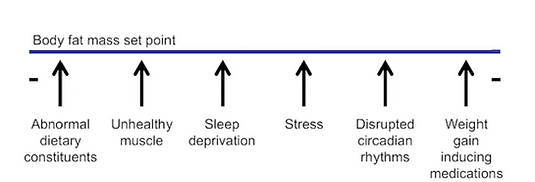
Tired of Diets That Don’t Work?
We offer personalized, medically-guided weight loss that targets the root causes - hormones, metabolism, emotional eating, and more.Learn how we help you lose weight - and keep it off.
Medical Weight Loss in King of Prussia: Work With Your Body, Not Against It
If you're looking for a medical weight loss clinic in King of Prussia, you're not alone.
Many people struggle to lose weight and keep it off - despite their best efforts with diet and exercise.
That’s because weight is regulated by complex biology - not just willpower.
The "Thermostat" Analogy: Your Body’s Weight Set Point
Think of your body like a house with a thermostat.
It works to maintain your weight at a certain “set point”.
When you try to lose weight, your body sees it as a threat and reacts by:
-
Slowing your metabolism
-
Increasing your hunger hormones
-
Triggering cravings for high-calorie foods
That’s why after initial weight loss, it often feels like your body is fighting back. It’s not sabotage - it’s a natural survival mechanism.

Why Did My Weight Set Point Increase Over Time?

The set point can rise gradually due to many factors:
-
Highly processed foods that stimulate reward centers in the brain
-
Irregular sleep or untreated sleep apnea
-
Chronic stress and emotional eating
-
Weight cycling (yo-yo dieting)
-
Certain medications (e.g., antidepressants, beta-blockers, insulin, antiallergic medications)
-
Hormonal changes (including pregnancy, PCOS or menopause)
-
Genetic susceptibility
Understanding this can remove the guilt and open the door to smarter, biology-based solutions.
What Do "Overweight" and "Obesity" Mean?
We often use Body Mass Index (BMI) to estimate how weight relates to health. It's a quick calculation based on your height and weight:
Category
BMI Range
Overweight
Obesity (Stage 1)
Obesity (Stage 2)
Obesity (Stage 3)
Under 18.5
18.5 – 24.9
25 – 29.9
30 – 34.9
35 – 39.9
40 and above
Healthy Weight
Underweight
🔍 Note: BMI isn’t perfect — especially for those with higher muscle mass, such as athletes. It also may underestimate health risks in people of Asian descent, where lower BMI thresholds may apply.
📏 What About Waist Size?
Waist circumference is another important measure. Carrying more fat around your belly can increase your risk for conditions like diabetes, heart disease, and kidney disease.
-
For women: Waist over 35 inches may be a concern
-
For men: Waist over 40 inches may signal higher risk
🧪 Why We Sometimes Use Body Composition
A body composition analysis can give us more detailed insights:
-
How much of your weight is muscle vs. fat
-
Where your body stores excess fat
-
Your hydration status
This helps us create a more accurate and personalized plan for you.
What’s the Best Evidence-Based Way to Lose Weight Safely?
At our King of Prussia weight loss clinic, we focus on evidence-based weight management. You can gently “nudge” your set point lower with consistent support and the right tools, including FDA-approved medications like Semaglutide and Tirzepatide, behavior coaching, and nutrition support.
We use the BEAM Box framework to support long-term weight and health changes in four key areas:
🧠 Behavior – Managing sleep, stress, and emotional patterns
🥗 Eating – Sustainable, nourishing meals tailored to your needs and your health
🏃 Activity – Gentle movement that fits your life with a focus on strength training
💊 Medications – FDA-approved options that reduce hunger and help reset the set point
Your Personalized Weight Loss Options: From Lifestyle to Medications like Semaglutide or Tirzepatide
We offer individualized weight loss treatment plans tailored to your biology, lifestyle, and health goals.
Options include:

Lifestyle Modifications (2–5% weight loss): Foundational habits that improve health, even without dramatic weight change.

Pharmacotherapy (5–20% weight loss): Safe, effective medications that can help reduce appetite and support long-term weight control.

Metabolic/Bariatric Surgery (20–40% weight loss): Highly effective for patients with severe obesity or weight-related health conditions.
Weight Loss Medications We Prescribe: Including GLP-1s Like Semaglutide & Tirzepatide
We prescribe a range of FDA-approved weight loss medications to support appetite control, insulin resistance, and long-term weight maintenance. This includes GLP-1 receptor agonists such as Wegovy®, Ozempic®, and Mounjaro®, known for their effectiveness in treating obesity.
Hunger
Fullness
Food Desire
Insulin Resistance
Semaglutide
(GLP-1 Receptor Agonist)
Wegovy, Ozempic, Rybelsus
Phentermine
(Adrenergic Stimulant, FDA approved for short term use)
Adipex, Lomaira
Phentermine/ Topiramate
(Stimulant/Neurostabilizer of GABA Pathway)
Qsymia
Naltrexone/ Bupropion
(Opioid Receptor Antagonist/ Dopamine Pathway)
Contrave
Orlistat
(Pancreatic Lipase inhibitor)
Xenical
DISCLAIMER:
-
Weight loss varies widely among patients when using medications. Not everybody loses the same amount of weight with one type of medication. Sometimes one medication must be complemented with another medication.
-
THE ABOVE MEDICATIONS are FDA-approved for BMI >30 (kg/m2) or for BMI >27 (kg/m2) plus co-morbidity and are to be used only in conjunction with lifestyle modifications.
How Much Weight Loss Is Enough For Me?
Even modest weight loss can lead to significant health improvements. Here's how different percentages of weight loss can benefit specific conditions:

Source: Figure adapted from Cefalu et al. (2015)
3–5% Weight Loss
-
Improvements Observed:
-
Reduction in blood glucose levels
-
Lowered blood pressure
-
Improved lipid profiles (e.g., decreased triglycerides)
-
Clinical Significance: Even modest weight loss in this range can lead to meaningful health benefits, particularly in reducing the risk of developing type 2 diabetes and cardiovascular diseases.
5–10% Weight Loss
-
Improvements Observed:
-
Further reductions in blood glucose and HbA1c levels
-
Enhanced insulin sensitivity
-
Greater improvements in blood pressure and lipid profiles
-
Alleviation of symptoms related to conditions like osteoarthritis and obstructive sleep apnea
-
-
Clinical Significance: Weight loss in this range is associated with significant health improvements and is often recommended as an initial target for individuals with obesity-related co-morbidities.
10–15% Weight Loss
-
Improvements Observed:
-
Substantial improvements in glycemic control
-
Marked reductions in blood pressure and lipid levels
-
Improved liver function and reduction in fatty liver disease
-
-
Clinical Significance: Achieving weight loss in this range can lead to profound health benefits, including the potential remission of type 2 diabetes and significant reduction in cardiovascular risk
>15% Weight Loss
-
Improvements Observed:
-
Major improvements in metabolic parameters
-
Potential remission of type 2 diabetes
-
Significant reduction in the risk of certain cancers
-
-
Clinical Significance: While more challenging to achieve, weight loss exceeding 15% can lead to dramatic health improvements and is often considered in cases where substantial weight reduction is necessary for health restoration.
📅 Ready to work with a board-certified weight loss doctor in Philadelphia area?
Schedule your personalized medical weight loss consultation today and take the first step toward feeling better in your body.
